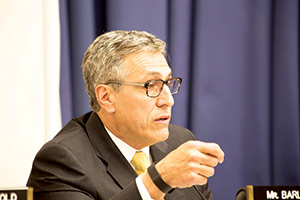Agency Ready to Start HOS Study; N.Y. Rep. Casts Doubt on Methods

This story appears in the May 4 print edition of Transport Topics.
WASHINGTON — The Federal Motor Carrier Safety Administration announced it has exceeded its goal of recruiting more than 225 truck drivers to participate in a hours-of-service study, but a member of Congress said he does not think the agency will be able to reach a fair conclusion when it unveils its report later this year.
“They’re engaging in a study they will like us to believe that they will come out with later this year that is unbelievable at its face because they’re hiring the same people again,” Rep. Richard Hanna (R-N.Y.) said April 29 at a House Highways and Transit Subcommittee hearing.
Hanna was referring to FMCSA’s selection of the Virginia Tech Transportation Institute to perform a congressionally mandated study of HOS. The institute had conducted an HOS study in 2011 that was criticized by industry groups and others.
Hanna also has called on Transportation Secretary Anthony Foxx to guarantee the study includes comparative data on safety-critical events such as crashes, near crashes and crash-relevant conflicts that occur during the rush-hour period of 5 a.m. to 9 a.m.
A fiscal 2015 funding law enacted in December suspended enforcement of a rule that truck drivers take off two consecutive periods of 1 a.m. to 5 a.m. during a 34-hour restart. The law also required the study, which FMCSA said should be completed before the end of the year.
Also at the hearing, Rep. Lou Barletta (R-Pa.) took issue with the agency’s Compliance, Safety, Accountability program.
“I’ve heard from companies in my district that the scores are flawed and do not provide good information about the safety record of the commercial motor vehicle companies,” Barletta said.
In March, he introduced legislation that would keep the agency from making public truck and bus operator safety scores until CSA’s measurement system is redesigned.
His legislation would require the Department of Transportation to contract with the National Academy of Public Administration for an analysis proposing ways to improve the CSA program.
The agency posts carriers’ safety scores on its website, including information on crashes in which a carrier has been involved. The postings, however, do not indicate what party was at fault, a situation the industry has said is unfair when most accidents involving trucks are the fault of a driver in a passenger vehicle.
Testifying on behalf of American Trucking Associations, Tom Kretsinger, president of American Central Transport, based in Liberty, Missouri, proposed that FMCSA establish a “gold-standard” program that rewards fleets that adopt emerging safety tools and technologies. The agency would then provide certain credits in its safety scoring system for carriers that invest in voluntary safety technologies.
The program, Kretsinger said, would encourage fleets to adopt safety devices absent a regulatory mandate.
“The trucking industry is justifiably proud of its long-term safety record,” Kretsinger said. “However, to continue this trend we will require more creative approaches and acknowledgment of the most common causes of truck crashes.”




